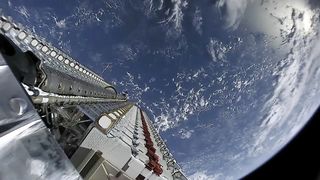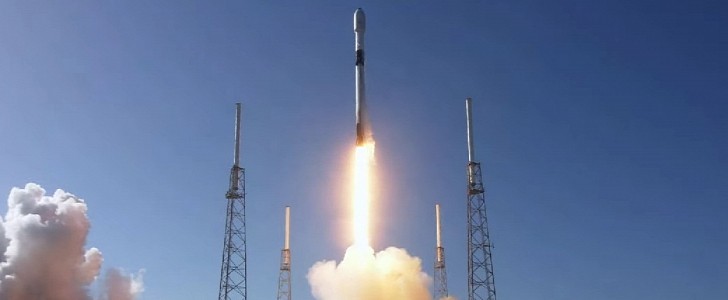Kate Duffy
Sat, 5 March 2022

SpaceX CEO Elon Musk.Patrick Pleul/picture alliance via Getty Images.
Satellite internet like Elon Musk's Starlink won't make undersea cables extinct, experts say.
They told Insider that satellite systems and submarine telecoms cables would exist side by side.
Cables are cheap and have great capacity but satellite systems are better for rural areas, they said.
Satellite internet constellations like SpaceX's Starlink and Amazon's Project Kuiper won't lead to the extinction of giant undersea telecoms cables, industry experts say.
Over the past year, thousands of satellites have been launched into orbit to build out internet service for people on Earth. Elon Musk's Starlink has about 2,000 satellites in orbit presently, and plans to have 42,000 by mid-2027. Amazon's Project Kuiper constellation plans to put more than 3,000 satellites in orbit, while the UK's OneWeb has already launched more than 400 satellites.
Meanwhile, there are more than 400 undersea internet cables connecting the world.
While undersea cables handle hundreds of terabits of data per second and can connect entire continents, satellite internet systems target individual homes, businesses, and communities in rural, underserved, and remote locations.
Brian Lavallée, a senior director at telecoms equipment supplier Ciena, said satellite internet networks and undersea cables were "highly complementary" and not intended to compete against each other.
"Think of satellite networks as on-ramps to highways with the highways being the submarine networks," he told Insider. "For small islands with no submarine cables, satellite networks are a viable, or sometimes the only, alternative."
He added: "Satellite internet access is not likely to overtake undersea cable infrastructure in our lifetime, primarily because they're not intended to compete."
Howard Kidorf, managing partner of undersea telecoms consultancy Pioneer Consulting, said satellite networks were "synergistic" and posed "no threat" to undersea cables.
"When it comes to delivering traffic to underserved regions, either in the United States, Africa, or Australia, yes, the satellite constellations are the game-changer," he told Insider.
Satellite networks have a key advantage over undersea cable networks: If a satellite network already serves a particular area, users need only buy an uplink kit to get online. Meanwhile, it takes weeks or months to lay an undersea internet cable – and that's not including the planning process beforehand, which can take up to two years because permitting, environmental, and regulatory hurdles need to be jumped.
Satellite systems are expensive, though. Musk said Starlink would likely need up to $30 billion in investment to become a viable business. Submarine cables are "tremendously cheaper" by comparison, Kidof said, costing the industry around $2 billion a year.
In January, Tonga was hit by a volcanic eruption that triggered a tsunami and severed the island's 514-mile undersea internet cable, cutting off the country's communication links to the rest of the world. SpaceX's Starlink jumped in to restore Tonga's internet while the cable was repaired.
But even if Starlink had been up and running before the eruption, it might not have helped maintain Tonga's connection, Lavallée suggested.
"The undersea volcano spewed a giant plume of dust and ash into the atmosphere, which could adversely affect or outright block communications between satellites and ground stations, even if you had sufficient satellite connectivity," he said.
Elon Musk says Starlink was told to block Russian news sources but it will not do so unless forced 'at gunpoint'
Elon Musk said he was "sorry to be a free speech absolutist."
SpaceX's Starlink was told by some governments to block Russian news sources, Elon Musk says.
On Saturday, Musk tweeted that the company would not do so "unless at gunpoint."
Musk had previously shared concerns over Starlink systems being targeted in Ukraine.
SpaceX's Elon Musk tweeted on Saturday that Starlink was told by some governments to block Russian news sources.
Musk said on Twitter: "Starlink has been told by some governments (not Ukraine) to block Russian news sources."
"We will not do so unless at gunpoint," he added. "Sorry to be a free speech absolutist."
SpaceX did not immediately respond to Insider's request for comment.
Musk said in another tweet, minutes before announcing that it would not block Russia's news outlets: "SpaceX reprioritized to cyber defense & overcoming signal jamming."
He added that it "will cause slight delays in Starship & Starlink V2."
Musk said on February 27 that SpaceX had activated its Starlink internet service in Ukraine after pleas from Mykhailo Fedorov, vice prime minister and the minister of digital transformation, to provide more Starlink stations as the Russian invasion is disrupting the country's internet services.
Insider's Kate Duffy reported recently that a Starlink customer in Ukraine said he had readied his satellite internet dish for emergency use, in case regular broadband services were cut during Russia's invasion.
In early February, SpaceX launched a faster version of the satellite internet service, called Starlink Premium. It said the version was designed for better performance in extreme weather conditions.
Elon Musk says SpaceX focusing on cyber defense after Starlink signals jammed near Ukraine conflict areas
By Tariq Malik
Starship and Starlink V2 progress will be delayed, Musk said.

By Tariq Malik
Starship and Starlink V2 progress will be delayed, Musk said.

A fleet of SpaceX Starlink internet satellites is seen poised for deployment in orbit in this file image from a May 24, 2019 launch. (Image credit: SpaceX)
SpaceX founder and CEO Elon Musk said Friday that his company is now focusing on cyber defense and overcoming signal jamming of its Starlink internet satellites amid Russia's ongoing invasion of Ukraine.
Musk and SpaceX sent Starlink terminals to Ukraine at the request of a government official after internet service was disrupted across the country by the Russian invasion. A shipment of Starlink ground terminals, which use an antenna and terminal to access the satellite broadband service, arrived in Ukraine by Monday Feb. 28). With the terminals in use, SpaceX is working to keep them online, Musk said.
"Some Starlink terminals near conflict areas were being jammed for several hours at a time," Musk wrote in a Twitter statement Friday (March 1). "Our latest software update bypasses the jamming."
Sponsored Links
Related: How will Ukraine keep SpaceX's Starlink internet service online?
SpaceX founder and CEO Elon Musk said Friday that his company is now focusing on cyber defense and overcoming signal jamming of its Starlink internet satellites amid Russia's ongoing invasion of Ukraine.
Musk and SpaceX sent Starlink terminals to Ukraine at the request of a government official after internet service was disrupted across the country by the Russian invasion. A shipment of Starlink ground terminals, which use an antenna and terminal to access the satellite broadband service, arrived in Ukraine by Monday Feb. 28). With the terminals in use, SpaceX is working to keep them online, Musk said.
"Some Starlink terminals near conflict areas were being jammed for several hours at a time," Musk wrote in a Twitter statement Friday (March 1). "Our latest software update bypasses the jamming."
Sponsored Links
Related: How will Ukraine keep SpaceX's Starlink internet service online?
Americans Will Fly Broomsticks Instead of Russian Rockets, and Elon Musk Has the Best Kind
5 Mar 2022, 08:14 UTC
As Russia continues its violent invasion of neighboring country Ukraine, no-longer-veiled threats against the United States and NATO members are coming from all sides. The International Space Station (ISS) and whatever agreements Russia had with other countries for space exploration are also subject to them.
On March 3, Roscosmos chief Dmitry Rogozin announced that Russia would no longer supply rocket engines to the United States, or offer service and maintenance to those already delivered. As per an ongoing agreement, Russia delivered 122 RD-180 engines to the U.S. since ‘90s, of which 98 were used to power NASA launch vehicles, and 24 were still in use.
Rogozin went on state television to say that the U.S. would not be getting any more rocket engines and that those 24 were now officially without service, Reuters reports. The announcement came as response to the decision to impose sanctions against Russia for the Ukraine invasion, Rogozin added, and it would leave Americans without a means to get to space.
“In a situation like this we can't supply the United States with our world's best rocket engines. Let them fly on something else, their broomsticks, I don't know what,” he said.
A few years ago, Rogozin told the national media that Americans would have to use trampolines to launch themselves into space if it were not for Russian tech, so a flying broomstick would be a step forward either way. As luck would have it, Elon Musk has just the perfect kind of flying, American-made broomstick and, no, he didn’t steal it from a witch.
The SpaceX CEO is clearly keeping very close tabs on the Ukraine crisis, and how it has already and could further impact space exploration. After previously saying he would “save” the ISS should Russia decide to stop powering it and just let it drop from space onto whatever piece of land they wanted, Musk is now offering his very own broomstick as a good replacement for Russian rocket engines.
“American Broomsticks,” Musk tweeted, adding a video of Falcon 9 launching 47 Starlink satellites into orbit.
SpaceX is already a partner for NASA, but Musk is determined to show that it could successfully substitute for Russia in every aspect used by Roscosmos and Rogozin as some sort of leverage against the U.S.
Rogozin went on state television to say that the U.S. would not be getting any more rocket engines and that those 24 were now officially without service, Reuters reports. The announcement came as response to the decision to impose sanctions against Russia for the Ukraine invasion, Rogozin added, and it would leave Americans without a means to get to space.
“In a situation like this we can't supply the United States with our world's best rocket engines. Let them fly on something else, their broomsticks, I don't know what,” he said.
A few years ago, Rogozin told the national media that Americans would have to use trampolines to launch themselves into space if it were not for Russian tech, so a flying broomstick would be a step forward either way. As luck would have it, Elon Musk has just the perfect kind of flying, American-made broomstick and, no, he didn’t steal it from a witch.
The SpaceX CEO is clearly keeping very close tabs on the Ukraine crisis, and how it has already and could further impact space exploration. After previously saying he would “save” the ISS should Russia decide to stop powering it and just let it drop from space onto whatever piece of land they wanted, Musk is now offering his very own broomstick as a good replacement for Russian rocket engines.
“American Broomsticks,” Musk tweeted, adding a video of Falcon 9 launching 47 Starlink satellites into orbit.
SpaceX is already a partner for NASA, but Musk is determined to show that it could successfully substitute for Russia in every aspect used by Roscosmos and Rogozin as some sort of leverage against the U.S.
Editor's note: Photos in the gallery show the SpaceX American Broomstick, also known as Falcon 9.





No comments:
Post a Comment